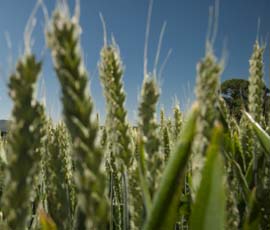Market conditions blamed for plant shutdown

Europe’s largest wheat bioethanol plant is to shut down temporarily from the end of May due to “unfavourable market conditions”.
Rising grain prices, poor European demand for ethanol and competition from imported US ethanol were all to blame for the Ensus shutdown, which could last for up to four months, commercial director, Grant Pearson said. But he stressed the closure was temporary and expected the plant would take wheat from the 2011 harvest, by which time market conditions should have improved.
“Grain price is an issue, as the rising cost of wheat impacts significantly on our working capital. It also means our margin between the cost of cereal energy crops and the price we get for the protein feed by-product (DDGS) has really been squeezed. Wheat has gone up over 100% from around £100/t a year ago to nearer £220/t, while DDGS has only increased 50% from £120/t to £170/t.”
But Mr Pearson said the biggest reason for the temporary closure was poor EU ethanol demand. This was due to slow implementation of the EU’s Renewable Energy Directive – which imposes stretching renewables and sustainability targets across the EU – and delays to a Voluntary Sustainability Scheme, which should allow biofuel suppliers to demonstrate compliance with RED sustainability criteria through an independent audit.
“The RED came in at an EU level on 6 December 2010, but only Germany and Austria have implemented it so far. Others plan to bring it in over the next three to six months, but UK implementation is likely to be next year. Because the RED hasn’t been in place, there hasn’t been the drive to increase biofuel inclusion mandates.
“Also, because the voluntary sustainability scheme hasn’t been approved, we’ve not been able to sell our product into markets that have moved to the RED.”
Combined with this, Mr Pearson said US ethanol imports had increased four-fold over the past year as fuel companies benefitted from a $0.45/gallon tax credit on ethanol inclusion and exploited a loophole in the import system. “Essentially they’re blending ethanol and gasoline in the US to get the tax credit, then exporting it to Europe. They’re also bringing it in as a ‘chemical’, which means they pay a lower tariff than for alcohol imports. The EU has identified this loophole and is looking at how to close it without infringing WTO rules.”
A further factor was that the US had reached a “blend wall” and further infrastructure investment – such as new pumps – was needed to allow greater rates of bioethanol inclusion, he said. “This inclusion rate was 10%, but has increased to 15% for cars made after 2001. The infrastructure takes time, which means the US has over capacity of ethanol supply in the short-term.
“We hope that when Ensus comes back on stream, harvest will be in full flow and a lot of these factors will be improving.”
Mr Pearson also confirmed there had been some issues with odour from the site and problems with the consistency of DDGS products, but said both issues had been resolved and were not connected to the temporary shutdown.
Meanwhile, Vivergo hopes to have its Hull bioethanol plant in production by early 2012 at the latest. It expects to appoint new contractors in the next few weeks, following termination of the contract with the original main contractor, Redhall Engineering Solutions Ltd, on 11 March.
“Our priority is to be up and running as soon as possible,” said a Vivergo spokeswoman, who said the company was confident its plant would not encounter emission problems like those at the Ensus plant. Some of the parts which Ensus had fitted as add-ons to tackle the problems were integral to the Vivergo design, she said.
Ensus facts
• World’s largest cereal grain biorefinery at Wilton on Teesside
• Cost around £300m
• Capacity to use 1.2m tonnes UK feed wheat a year, to produce over 400m litres of bioethanol, 350,000t high-protein animal feed (Distillers Dried Grains & Solubles’), and 300,000t carbon dioxide for use in food and drink industry
• Began production in February 2010
• Was taking 80-90,000t of wheat a month
• Glencore supplies all wheat and markets DDGS
Timeline
Spring 2007 – Construction began
November 2009 – Ensus started taking UK wheat
March 2010 – First bioethanol shipment despatched
April 2010 – Environment Agency called in to investigate odour problems
June 2010 – Brief shutdown to remedy odour problems
End May 2011 – Production due to stop temporarily for two to four months
